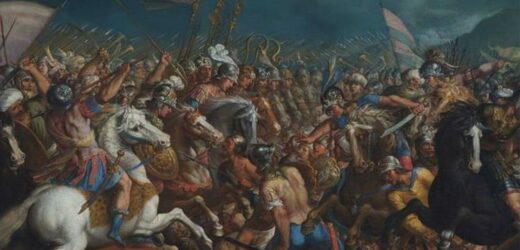Roman genocide of Carthaginian subjects discussed by expert
We use your sign-up to provide content in ways you’ve consented to and to improve our understanding of you. This may include adverts from us and 3rd parties based on our understanding. You can unsubscribe at any time. More info
Under the Romans, the world became connected like never before. Within a single empire, lands from Scotland to the Middle East fell under one roof. Founded somewhere around 625 BC, the Roman Empire became the greatest power in the world and was led by a long list of emperors who each had differing philosophies and political directions.
One of the main goals of the empire included self-enrichment, and to do this required a policy of expansionism.
By 338 BC, Rome — the empire’s capital — had gained control over the entire Italian peninsula.
Sometime later, in around 264 BC, the Punic Wars began, a series of three wars between the Roman Republic and the Carthaginian (Punic) empire.
They would last for nearly 100 years.


While Carthage managed to get the upper hand in some battles, the wars ultimately led to its destruction.
The Romans, aware that Carthage posed a great risk, were willing to utterly decimate it, as noted during the Smithsonian Channel’s documentary, ‘Eight Days that made Rome’.
Here, the now-famous attack of general Scipio Africanus on Carthage was explored, and how it revealed the brutality and cruelty of the Romans that would become characteristic of their military might.
Carthage’s greatest fighter and general was Hannibal, who in 219 BC led an attack on Saguntum, an independent city allied with Rome.
He later marched his army across the Pyrenees and Alps and into central Italy in what would become one of the most famous military campaigns in history, gaining a foothold in southern Italy where his victory in Cannae gave him considerable control over the region.
JUST IN: UK’s hidden gold mine to invigorate British economy

While Rome fought a desperate war in Italy, preventing Hannibal from attacking the city itself, the Roman generals made a wider plan to destabilise the Carthaginian Empire.
This came in 210 BC when they launched a power attack in Carthage’s main power base, Spain.
Scipio was just 25 when he became general of the army and almost immediately turned the war in Rome’s favour, capturing Catharginian forces and cities.
But the way he went about it was savage, and as the documentary’s narrator, Bettany Hughes, noted: “He did so with downright cunning and cruelty that would come to be a hallmark of Roman warfare.”
His bloodthirsty work was uncovered in the ancient city of Illiturgis, Andalucia, southern Spain.
DON’T MISS
Archaeology: New evidence could rewrite Native American history [REPORT]
EU crumbles as 20 countries agree to spread Putin’s sky-high gas price [INSIGHT]
Archaeologists stunned by link between Halley’s comet and Christianity [ANALYSIS]


Here, researchers uncovered evidence for mass civilian genocide committed by Scipio and his Roman army.
Juan Pedro Belen, an archaeologist leading the dig, explained: “We think that Scipio came with weapons and the idea of entirely destroying the city.”And we think there was a kind of genocide by the Romans because we have no evidence of a population in the landscape after the siege.
“The population was pretty much wiped out, probably 80 to 90 percent of the population was eliminated.”
Ms Huges noted: “The evidence found by Juan Pedro and his team is compelling.”

Weapons of varying styles and sizes were found, all indicating a savage Roman assault.
Ms Hughes continued: “At the exact historical moment that Roman weapons appear in this landscape, nearly all signs of life in Illitrugis disappear from the archaeological record.
“It’s sobering to think that Scipio, one of Rome’s greatest heroes, was capable of the cold-blooded massacre of men and women who dared to defy Rome.”
Eventually, the Second Punic War came to an end through a peace agreement.

Carthage was given the right to keep control over its North African territory but lost its other overseas territories, also forced to surrender its fleet.
A further blow saw Carthage made to pay a hefty indemnity in silver and to agree never again to re-arm or declare war without permission from Rome.
Hannibal had only narrowly escaped death from the defeat at Zama.
While he managed to retain his military title, the desire to beat the Romans persisted.
He would continue in his military pursuits against Rome from abroad, a feat which was ultimately futile and which led to him poisoning himself while cornered in the Bithynian village of Libyssa, probably around 183 BC.
Source: Read Full Article


